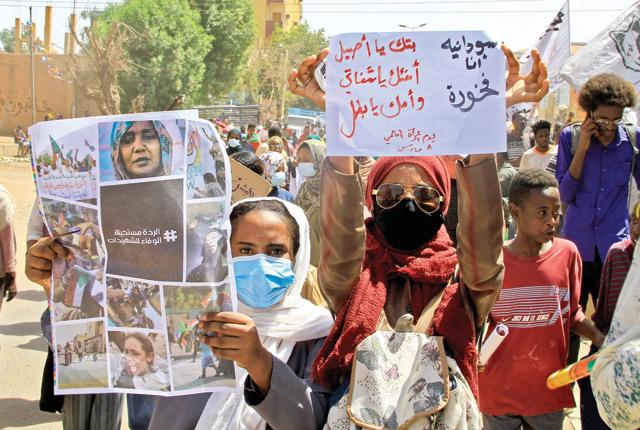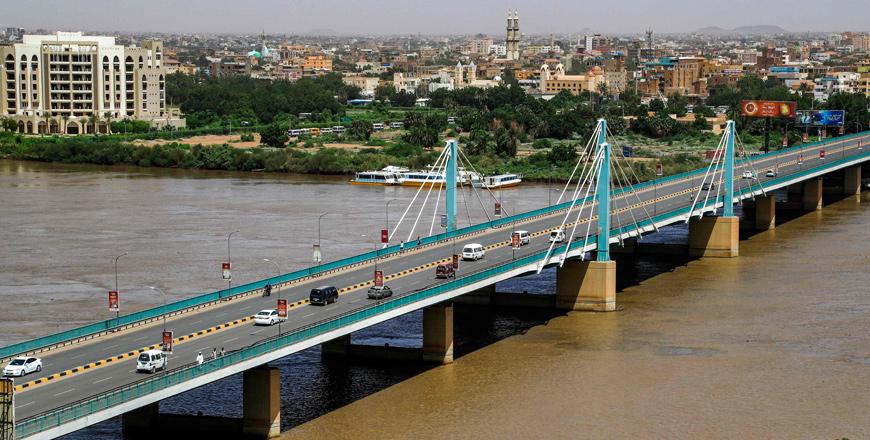You are here
Sudan arrests senior opposition leader amid protest crackdown
By AFP - Mar 08,2022 - Last updated at Mar 08,2022

Sudanese rally to mark the International Women's Day in Sudan's capital Khartoum, on Tuesday (AFP photo)
KHARTOUM — Sudanese security forces arrested a senior opposition leader Tuesday, as officers fired tear gas to stop thousands of protesters rallying against last year's military coup, an AFP correspondent said.
The demonstrations were the latest since an October 25 military takeover led by army chief Abdel Fattah al-Burhan, which was followed by a broadening crackdown on civilian and pro-democracy figures in the northeast African nation.
At least 85 people have been killed and hundreds wounded by security forces during more than four months of protests demanding civilian rule and justice for those killed in demonstrations, according to medics.
On Tuesday, security forces fired a barrage of acrid tear gas at crowds heading towards the presidential palace, with several people injured, an AFP correspondent said.
The ruling Sovereign Council is based at the palace along the Nile River in Khartoum.
Tuesday's protests coincided with International Women's Day.
Crowds chanted slogans in support of Sudanese women — who have played a key role in the recent protest movement, as well as in rallies that paved the way to the 2019 ouster of longtime autocrat Omar Al Bashir.
"Long live the 'Kandakas'," the crowd shouted, using the name for ancient Nubian queens.
In North Khartoum, many waved national flags or carried posters of fellow demonstrators who have been killed, witnesses said.
'Excessive force'
Also on Tuesday, prominent politician Babiker Faisal was arrested while he was attending a funeral in North Khartoum, according to Sudan's Unionist Alliance, a pro-democracy political party.
Faisal was a member of the committee tasked with recovering properties seized during Bashir's three-decade rule, before he was toppled and jailed.
Last month, several senior committee members were arrested, including Mohamed Al Fekki, who was also a member of Sudan's Sovereign Council before he was ousted in the October coup.
Since the military takeover, authorities have accused the committee of misappropriating funds that it confiscated, accusations its members deny.
The military power-grab derailed a transition to full civilian rule negotiated between military and civilian leaders following Bashir's ouster.
On Monday, the UN Human Rights Council said it estimated around 1,000 people have been arrested since the coup, including women and children.
“The Sudanese authorities must cease to use excessive force and live ammunition against protesters,” said United Nations human rights chief Michelle Bachelet, calling for the release of detainees.
Hers was the latest such call from United Nations figures and the United States. The most recent protester killings occurred on February 28 when two died, according to medics.
Also on Monday, the ambassadors of the European Union, Canada and the United States slammed “attempts to unduly limit freedom of expression” in Sudan.
“We therefore call on the de facto Sudanese authorities to return to commitments made to defend media freedom... and respect the right to peaceful assembly,” the diplomats said.
Darfur violence
On Tuesday, deputy chairman of Sudan’s Sovereign Council, Mohamed Hamdan Daglo, met with African Union envoy Mohamed Lebatt to discuss the crisis in the country. The AU has suspended Sudan’s membership since the coup.
Daglo leads the Rapid Support Forces, into which thousands of Janjaweed gunmen from Sudan’s western Darfur region were integrated, and who were accused of atrocities in the conflict that erupted there in 2003.
Fighting in Darfur pitted ethnic minority rebels, who complained of discrimination, against the Arab-dominated government of Bashir.
The latest peace deal was signed in 2020, but since the coup Darfur has seen violence spike, with around 250 people killed in fighting between herders and farmers since October.
The region remains awash with weapons and deadly clashes erupt, often over access to pasture or water.
On Tuesday, medics said that clashes on Saturday between the Massalit and Arab groups left 16 people dead.
Related Articles
KHARTOUM — Sudan's foreign ministry on Saturday condemned the killing of 18 Sudanese people during an attack by an armed group from Chad, st
KHARTOUM — Sudan's fragile transitional government said it foiled an attempted coup early Tuesday involving military officers and civilians
KHARTOUM — Sudan’s supreme court has upheld death sentences for 29 intelligence officers for torturing and killing a teacher arrested during

















